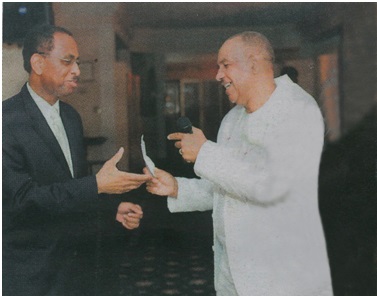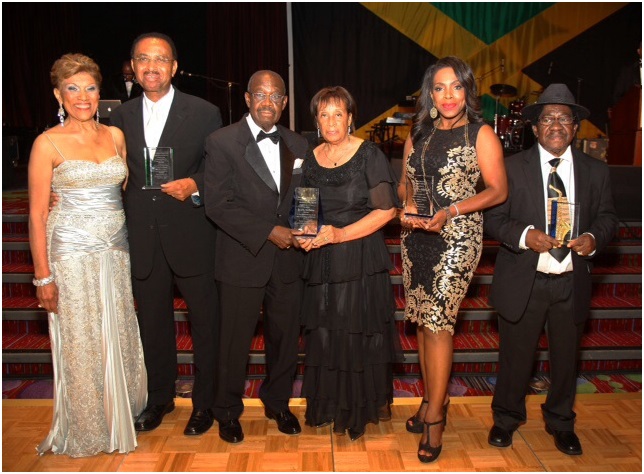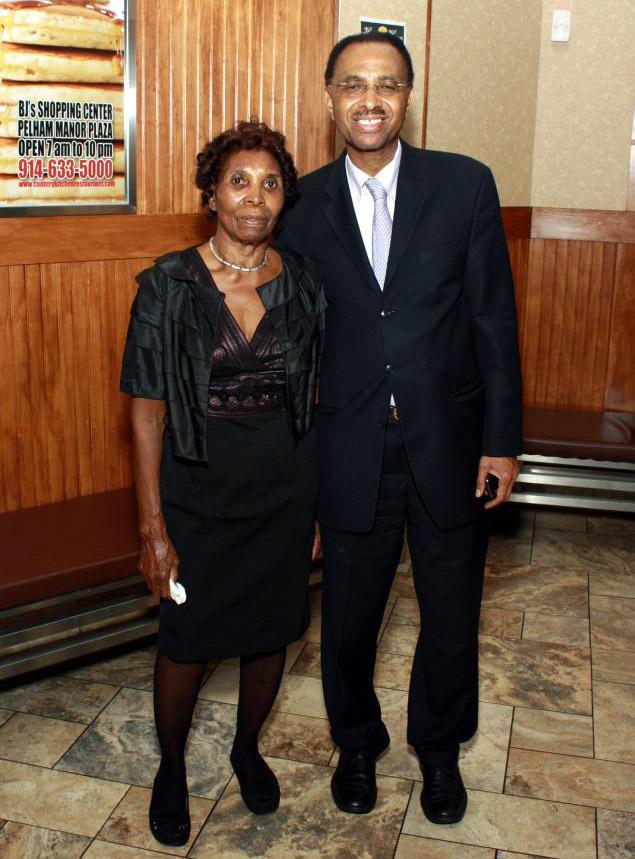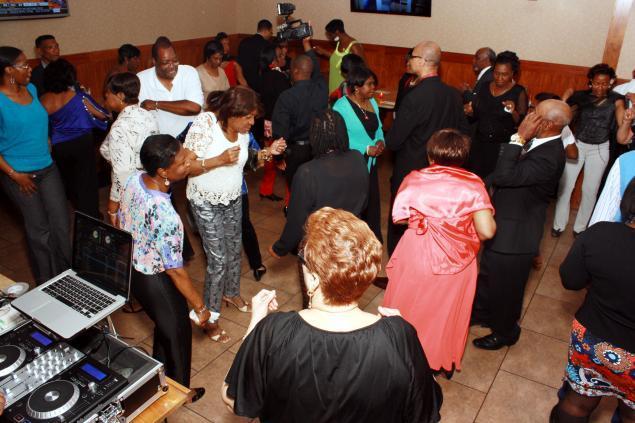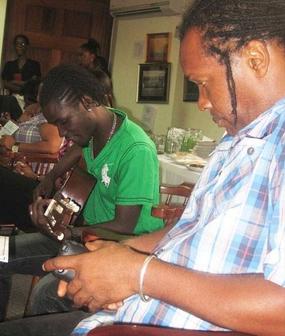Jah Jerry News
(printable)
Jah Jerry Organization receiving donation from UTech Alumni Association NYC Chapter
SephronMair, president of UTechAlumini Association NY Chapter and Director of Union of Jamaica Alumni Association ( UIAA), seen here making a donation to Jerome Haynes, CEO of Jah Jerry Foundation. Occasion was Mair's annual summer ending soiree and dinner dance heldatthe Davenport Country Club in New York Sunday September 7.
Source: The NA Weekly Gleaner September 11-17 2014
***********************
Honoring Greatness - Skatalites Band PJ and Jerome Haynes
JICFI chair Paulette Willoughby poses with honorees Jerome Haynes, son of Jah Jerry Haynes, Karl and Faye Rodney, Sheryl Lee Ralph and Lester Sterling.
Wearing his `special presenter’ hat Mr. Patterson, who managed the Skatalites before his transition from lawyer to politician, had the privilege of presenting Lester Sterling with his award and posthumously to former original members: Don Drummond, (trombone); Lloyd Knibb, (drums); Jerome, “Jah Jerry” Haynes, (guitar); Jackee Mitto, (pianio); Lloyd Brevett, (bass and drum); Tommy McCook, (tenor saxophone); Roland Alfonso, (tenor saxophone) and John ‘Dizzy Moore, (trumpet).
Sterling went on to wow the room with powerful renditions of Freedom Sound the Skatalites’ theme song, Take 5 and Puppa Lick. Backed by Fab 5 and accompanied by Leroy Graham Jr, on tenor sax, it was Ska resplendent and awesome to the ears–a true moment in time. Master of Ceremonies for the evening, Jeff Barnes kept the room buzzing with quips that elicited plenty laughter, enhancing the already pleasant and lively atmosphere in the room
***********************
A Scholarship Fundraiser Dinner Dance
Mary Haynes, widow of the late musician, and her son, James, the Bronx foundation founder at the group's first fundraiser at at the Country Kitchen Restaurant in Pelham Manor in Westchester County.
Bronx's Jah Jerry organization gives for education
Mary Haynes, widow of the late musician, and her son, James, the Bronx foundation founder at the group's first fundraiser at at the Country Kitchen Restaurant in Pelham Manor in Westchester County.
Bronx's Jah Jerry organization gives for education
Started just last year, the Jah Jerry Inc., the Bronx-based nonprofit educational organization named for the late Jamaican music guitarist Jerome (Jah Jerry) Haynes of The Skatalites, is celebrated Haynes by holding its first benefit.
The goal of the foundation, founded by Haynes’ son James, is to promote education and provide scholarships for young people in Jamaica and the U.S, and its April 27 Fundraiser Dinner Dance was a big step towards that objective.
Moving, grooving and mingling for a great cause, patrons enthusiastically party on the dance floor at the Jah Jerry Inc. Fundraiser Dinner Dance on April 27.
A sizable, enthusiastic crowd of supporters attended the event, held at the Country Kitchen Restaurant in Pelham Manor in Westchester County. The new organization donated desktop computers to two schools and awarded a scholarship to a college student.
For information on the Jah Jerry organization, call (917) 747-8053
***********************
Jah Jerry, Inc Begins Work In Jamaica
Published: Tuesday | January 29, 20130
Melville Cooke, Gleaner Writer
James Haynes' love for his father, the late guitarist Jerome 'Jah Jerry' Haynes, OD, was evident as he spoke inside the Institute ofJamaica's Council Room last Wednesday afternoon. So was his respect for guitarist Ernest Ranglin, who tutored Jah Jerry, a founding member of The Skatalites band.
So it is appropriate that the tagline of Jah Jerry, Inc, a non-profit organisation which made its first presentations on Wednesday, states "education is our primary mission". And with its first donations - a computer each to the Charlie Smith and TrenchᅠTown Comprehensive high schools, plus a US$1,000 scholarship to Edna Manley College of the Visual and Performing Arts student EltonᅠBrown - it has stayed true to its purpose.
FOCUS ON EDUCATION
James, who was accompanied by his wife Jean and a number of women who have provided support for Jah Jerry and himself, said the organisation is six months old.
"My father was really about education and possibilities. We felt we needed to do something that will address some of his concerns and the things he held on to," James said.
Amplifying on what the function's host, Winston Williams, had read about Jah Jerry, Haynes gave some personal reflections on his father, who "came from humble beginnings". Each thing Jah Jerry's father, who was blind, passed on to his son, he would "practise day and night".
"Every famous musician who emanates from this island, when they recorded their first song, my father was there," Haynes said, naming Desmond Dekker, Alton Ellis and Bob Marley among them.
GREATER PROFESSIONALISM
"My father never went to secondary school, but he learnt to read and write music," Haynes said, adding that Jah Jerry spent long hours studying.
"His legacy is a higher level of professionalism, a level of determination and, no matter where you come from, you can overcome social barriers. You have to put in the time, you have to put in the practice," Haynes said.
Minister of Youth and Culture Lisa Hanna spoke to three things music can do. First, it can "shape the minds of our young people". Then, she said, "there seems to be a level of pioneering". Finally, Hanna said, music gives a sense of consciousness.
Education Minister Ronnie Thwaites, noting Haynes' obvious love for his father, said "our creativity is the primary grace God has given us" and "we need to lift up these expressions".
Brown had many voices lifted up inside the Council Room as he did Concrete Jungle. And Haynes pledged that there will be more from Jah Jerry, Inc.
"This is the first of big things to come," he said.
His Legacy of learning
|

|
NEW YORK DAILY NEWS
Saturday, July 7, 2012, 11:23 PM
|
To the world, Jerome (Jah Jerry) Haynes is linked to music, known as a founding member of The Skatalites, the legendary and pioneering Jamaican ska band. But with the creation of an educational organization bearing his name, the late guitarist will also be commemorated for his great zeal for learning.
Jah Jerry Inc., a nonprofit organization promoting education and providing scholarships for young people in Jamaica and the U.S., will be launched on July 20, 2012 in the Bronx at a special event held at St. Luke’s Episcopal Church, 777 E. 222nd St. (near Barnes Ave.) from 8 p.m. to midnight, according to James Hanyes, son of the late member.
“When I was growing up, there was a sign in our home that read, ‘Going to school is nonnegotiable,’ ” said Haynes, adding that his father’s commitment to education made a permanent impression on him and his siblings.
My father stressed that education is the key to your future, it’s your passport , “said Haynes, adding that the foundation is being started” in memory of my father and in the spirit of Jamaica’s 50th anniversary of independence.
Students in Jamaica who meet the criteria of Jah Jerry Inc. can apply for scholarships. And students in the United States who qualify can also get educational awards.
The kickoff event features videos, vintage recordings and music by DJ Disco Kid. Donation is $30 per person and proceeds will benefit Jah Jerry Inc. and St. Luke’s Church Episcopal Church.
Haynes, who died in 2007 and was posthumously awarded the prestigious Jamaica Order of Distinction for “his contribution to the development of Jamaican music” was a founding member of the Skatalites whose Ska music proceeded rock steady and reggae.
For information on the Jah Jerry Inc. education organization or the kickoff event,
call (917) 747-8053.
***********************
Entertainment
The Jamaican Observer
Black Star Liner - Fred Locks recalls tribute to Garvey
BY HOWARD CAMPBELL Observer senior writer
Friday, August 17, 2012
Some songs become signature pieces for certain artistes and they cannot take a stage without performing them. What would a Marley concert be without No Woman No Cry or a Rolling Stones show minus Satisfaction?
The same would apply to singer Fred Locks if he did not belt out Black Star Liner, his ode to Pan-African giant Marcus Garvey’s ambitious attempt at mass repatriation to Africa.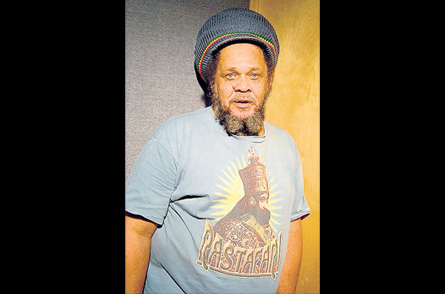
Fred Locks will likely sing his signature piece this evening when he appears on events marking the 125th year of Garvey’s birth. Thirtyseven years after he recorded it, Fred Locks says the song, and the Garvey message, remains relevant.
“As a Rastaman, repatriation (to Africa) is still a must, dat never change,” he told Splash. “As for Garvey, he was a great scholar. Rasta, Christian, Muslims… everybody can refer to him.”
Fred Locks says he co-wrote Black Star Liner with Owen Goode in 1968 after reading a Twelve Tribes of Israel pamphlet about Garvey. He was a member of the harmony trio, The Lyrics, and had recently accepted Rastafari.
The second of 12 children, Fred Locks was born Stafford Elliott in east Kingston. He was the youngest member of The Lyrics which also included Danny Campbell and Albert Tomlinson.
The songs he did with the group were mainly rocksteady ballads. They were recorded at Studio One and produced by Clement ‘Coxson’ Dodd.
Black Star Liner was totally different in tone and content. It was inspired by Garvey’s bold, but ill-fated initiative, to repatriate blacks to Africa through his Black Star Line steamship company.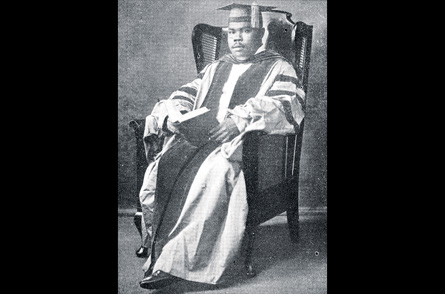
At the time, the St Ann-born Garvey was a leading figure in the Harlem progressive movement in New York City. He died in London in June, 1940 but his body was not returned to Jamaica until 20 years later to be interred at National Heroes Park.
A new generation of blackconscious youth had discovered Garvey’s work in the 1960s. Black Star Liner was one of several songs recorded during the 1970s, honouring his legacy.
The song was co-produced by Michael ‘Jah Mix’ Mowatt and Hugh ‘Boothie’ Boothe, both members of the Twelve Tribes of Israel. Featuring guitarists Earl ‘Chinna’ Smith, Jerome ‘Jah Jerry’ Haynes and Howard Roberts, bassist Earl ‘Bagga’ Walker, drummer Benbow Creary, and keyboardist Pablove Black, Black Star Liner’s rhythm track was recorded at Randy’s, the studio where Burning Spear had done his epic Marcus Garvey album that same year.
Released on the Jah Love Music label, Fred Locks says the song was initially distributed in Twelve Tribes circles, but made little impact. It got the attention of artiste manager/producer Tommy Cowan who had met the singer while he was ‘voicing’ the song at engineer Osbourne ‘King Tubbys’ Ruddock’s studio.
“Him mek two call to Don Topping at RJR an’ ET (Errol Thompson) at JBC (Jamaica Broadcasting Corporation) an’ in no time it enter the charts,” Fred Locks recalls. “It sell 9,000 copies in three months.”
The success of Black Star Liner influenced an album of the same name, produced by Boothe. The 10-track set, which had had other message songs such as Time to Change (The Last Days) and True Rastaman, was released in Britain by the independent Vulcan Records.
Fred Locks has six albums to his name, the last being 2008’s Glorify the Lord. His latest song, Your Love, was recently released by Caveman Productions.
This evening, he is scheduled to perform at the Kingston and St Andrew Corporation’s Garvey show on Windward Road in east Kingston, and at the Twelve Tribes of Israel headquarters at Hope Road, St Andrew.
August 17 (Garvey’s Birthday) activities
Floral tribute at the National Heroes Circle in Kingston at 8 am.
Following floral tribute Dr Julius Garvey, the hero’s son, is expected to visit Liberty Hall for the launch of the Marcus Mosiah Garvey Mobile Museum.
The Ministry of Education will launch the re-introduction of civics in schools on August 17, at the Marcus Garvey Technical High School in St. Ann's Bay
Prior to the launch, there will be a function to honour Mr Garvey, starting at 10:00 am at the St Ann’s Bay Parish Library.
UNIA Marcus Garvey Awards at 7 pm on the East Lawn of Devon House
Marcus Garvey Tribute concert at the Eastern Peace Centre, 121 Windward Road, St Andrew, at 8:00 pm. The concert features: Sizzla Kolonji, Nesbeth, Turbulence, Mackie Conscious, Fredlocks, Aaron Silk, Edi Fitzroy, Fabian Marley, Paul Elliot, EQ, Bongo Herman and the Warrior Love Band.
***********************
Jah Jerry Foundation launched in New York His Legacy Lives On
Deon Brown
Gleaner Writer
New York, Aug 15, 2012:
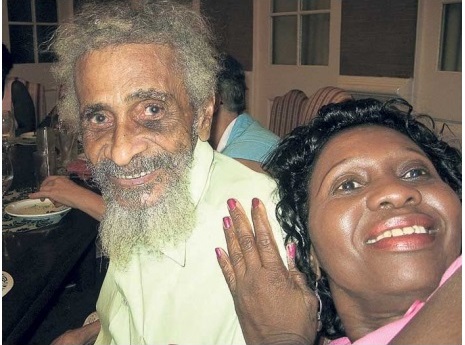 |
In the afterglow of the Independence celebrations in 2007, Jamaica lost one of its musical pioneers. Jerome Haynes, known to all as ‘Jah Jerry’ succumbed to pneumonia following surgery at 80.
The noted guitarist, a foundation member of the Skatalites, the session musicians credited with popularizing the ska sound, was one of a long list of cultural figures to pass away during that period.
The likes of Louise Bennett (folklorist), Desmond Dekker (singer), Clemente Dodd (producer), Johnny ‘Dizzy’ Moore (trumpeter) and of course Jah Jerry may no longer be with us but their work and those of so may others live on in the groundation of our culture.
It has been noted that one of the reasons Jamaica had an Independence is because it already was having an identity through its cultural expressions, thanks in large measure to our creative artistes.
The cultural blossoming was evident in the folk dialects and idioms, in drama, dance theatre, music and the whole range of the visual arts. It was unearthed, captured and given expression by organizations such as Jamaica Welfare Limited starting from the late 1930s, the Institute of Jamaica, the Little Theatre Movement, the School of Art and the School of Music, the National Dance Theatre Company (in the 1960s) as well as the parish and national festivals which began decades before Independence and which would later be placed under the umbrella of the Festival Office (now called the Jamaica Cultural Development Commission) after 1962.
As the 1950s gave way to the 1960s it became clear that this was a society in search of itself; a country moving steadfastly on a new mission. It was out of this internal quest and questioning that Jamaica discovered its own musical voice, giving birth to its first indigenous sound, ska which would evolve into rocksteady and later the even more celebrated reggae.
Today reggae is an international rhythm but the man who gave it early form was Jah Jerry whose guitar emphasis of the afterbeat gave Jamaican music its distinct, original sound. Jah Jerry had a long career in the business, working with scores of artistes and recording on hundreds of songs before retiring several years prior to his death.
The observance of the island’s fiftieth anniversary of Independence has provided the impetus for reflections and celebrations, and in the case of Jah Jerry, legacy building.
To give credit to the man and his music, and his contribution to Jamaican culture, the Jah Jerry Foundation was launched in New York City recently by members of his family. The foundation is the family’s homage to Jamaica 50 and the fifth anniversary of their father’s passing.
“My father loved his family, Jamaica and music,” Jah Jerry’s son, James Haynes told the Weekly Gleaner in an interview following the launch. “He started out playing mento and other music in 1949 to tourists in Montego Bay.
When Jamaica got into recording music in the 1950s he moved into this area and was one of the first session musicians to record in the studio, working with many pioneers - producers and singers - and was there when many of them recorded their first songs,” Haynes Jr. added.
He said his father wrote and arranged music, and spent most of his time at the studio but was also devoted to his children and the idea of education.
To honour his memory, the foundation will among other things, offer scholarships to high school students going on to tertiary education in Jamaica and the U.S. “Education was a top priority in our home of seven children,” James Haynes noted.
“There was a sign in our house that said, ‘Going To School is Non-Negotiable’. My father put that sign up. He was a quiet, humble man and a strong disciplinarian who believed in young people.”
A major fundraiser is planned for October to get the charity fully operational. A website (www.jahjerry.org) that will detail all the information on the scholarships and the foundation’s mission is currently under construction.
A musical tribute organized by the Haynes’ family was held recently at St. Luke’s Episcopal Church in the Bronx where ska and early reggae blasted through the basement doors as patrons celebrated the foundation members of Jamaican dance rhythm.
The legacy building continues as the Haynes family hopes to reclaim their father’s two guitars, one of which is on loan to a museum in Seattle for preservation purposes.
It is their intention to donate it some day to a cultural institution in Jamaica, established to showcase the archival treasures of Jamaica’s musical past. The second guitar is said to be in the possession of the producer/singer, Prince Buster with whom Jah Jerry worked closely at the start of their career.
“My father loved Jamaica so much,” added the younger Haynes. “He didn’t want to live in the U.S. He came to visit and to tour with the Skatalites but he didn’t want to ever leave Jamaica.”
It is on his beloved island that he died on August 13, 2007 days after celebrating Independence. Jah Jerry’s legacy lives on through a whole catalogue of Jamaican music.
In ska tunes like “Rockfort Rock”, “Hooligan Ska”, “Man In The Street”, “Oh Jezebel”, “Simmer Down”, “Oh Carolina”, “Carry Go Bring Come”, “Rivers of Babylon”, “Humpty Dumpty” and the original 1964 ska version of “One Love” - to name a few.
***********************
Jah Jerry and the sounds of Early Jamaica
BY DEON BROWN
Gleaner Writer
New York, Aug 08, 2012:
THE LATE guitarist Jerome 'Jah Jerry' Haynes, a founding member of the Skatalites is credited with having helped to develop the ska sound.
Prior to 1960, Jamaica had a serious love affair with American black music - the jazz, rhythm & blues and boogie-woogie that were filtering in from powerful radio trasmissions in the Southern U.S, as well as via the records, that migrant workers were taking back to Jamaica.
Jazz had a strong influence in Jamaica going back to the 1930s and every Jamaican musician at the time dreamt of being a jazz, player. They emulated the established black American jazz artistes and gave themselves jazz nicknames.
However after World War II, The big band orchestras began to lose favour in the U.S. and were replaced by the smaller, more economic r&B bands. A similar trajectory took place in Jamaica where 'orchestra dances' in 1940s Kingston gave way to sound system street operations in the 1950s.
It was the sound system operators who really popularised American music on the island.
Several of them emerged on the Kingston scene and started an agressive competition for new music to fill their weekly dances. They would go to the U.S. to purchase new records attempting to conceal the titles from their competitors and would travel across the island playing the music in verious town centres.
But as rock and roll which attracted a more white audience replaced r&b as the dominant music in the U.S. in the late '50s, the Jamaican promoters found themselves in a bind. Their source for new music had dried up but in true Jamaican inventive fashion they started to create their own.
Recording facilities were established in Jamaica in the 1950s and musicians started to record, at first producing materials that mimicked the black American music they adored. But as they experimented and added their interpretations, the music began to sound uniquely Jamaican, reflecting the folk patterns and rhythms of native life.
One theory holds that it was in a recording session with Prince Buster that Jah Jerry, strumming on his guitar started to emphasise the afterbeat, producing the dominant sound that would define early Jamaican music. Ska was born. The period was 1960-1961, pre-independence Jamaica.
Ska is a reflection of the island's diverse musical trends and exposure. It is a hybrid of Jamaican folk music (pocomania, the fife and drum of jonkanoo masquerades, European quadrille, plantation work songs, mento), American jazz, R&B, boogie-woogie and Afro-Cuban rhythms. According to Jamaican jazz pianist, Monty Alexander "Ska was jazz with a roots rhythm to make us dance."
***********************
JAZZ AFICIONADOS
Jah Jerry, a jazz enthusiast himself, had added jazz chords to ska. The instrumentalists who became most associated with this new art form were all jazz aficionados who worshipped at the feet of men like Miles Davis, Charlie Parker, Duke Ellington, Louis Armstrong and Dizzy Gillespie
The names that would become synonymous with the ska era included Don Drummond and Rico Rodriquez-trombonists; Roland Alphonso and Tommy McCook-saxophone; trumpeters 'Dizzy' Johnny Moore and Jackie willancy; drummers Drumbago and Lloyd Knibbs; the bassists Lloyd Brevett and Clue J; guitarist Jah Jerry and Ernie Ranglin and a whole range of other musicians and singers.
Roughly three years after the birth of ska, several of those mentioned went on to form the 'Skatalites' Band in the summer of 1964. The Skatalites were only a month old when the wailers which then included Bob Marley, Peter Tosh, Bunny Wailer, Beverley Kelso and Junior Braithwaite went to Sir Clement Dodd's Studio One Facilities to lay down some tracks.
The Skatalites were the backing band for the wailers' first recording and their first single "Simmer Down" which Dodd played at a dance the very night it was recorded. As history records it, it tore up the dance and soon sold 70,000 copies in Jamaica - a smash hit for a country with less than a million people at the time.
"Simmer Down" is regarded as on of the signature tracks of Jamaica's ska period, its rhythm defined by leading ska band of the day, the Skatalites. Their stamp is on most of the leading records of the period with Jah Jerry's guitar strumming ska beats comming through strongly on early hits such as Oh Carolina, Carry Go Bring Come, River of Babylon, Humpty Dumpty and the original 1964 ska version of One Love - to name a few.
Jamaica's musicians in many ways gave expression to the country. Their music became the sound track for independence. Ska was the musical declaration of the island's self-determination stance; a society in search of itself.
***********************
Lifestyle
The Jamaican Observer
By Basil Walters Observer Staff reporter
Monday, July, 14, 2008
JAVAA’s first 12 inductees in Jamaica music hall of fame impressive
The Jamaica Association of Vintage Artistes and Affiliates (JAVAA), celebrated its fifth anniversary on Friday with the first induction for the Jamaican Music Hall of Fame, saluting a wide array of musical icons from mento to reggae. The salutation was not only for on-stage performers, but also for those behind-the-scene unsung heroes and one noteworthy institution. It was a well attended history-making ceremony held on the lawns of the Pegasus Hotel.
Seven of the individual inductees were honoured posthumously. These were legendary folklorist/poet, Louise “Miss Lou” Bennet-Coverly; master drummer and founder of the Mysic Revelation of Rastafari (MRR), Oswald Williams, aka Count Ossie; pioneer mento/calypsonian , Norman Thoman, better known as Lord Flea; founder of the Alpha Boys’ School, Sister Mary Ignatius Davies; legendary producter/director, Vere Johns, who founded the famous Opportunity Hour talent contest, legendary record producer, Clement ‘Sir Coxsone’ Dood of Studio One fame; and giant record producer Arthur ‘Duke’ Reid.
The original Wailers – comprising Bob Marley, Peter Tosh, Bunny Wailer, Junior Brathwaite, Beverly Kelso and Cherry Green – were also inducted. Of the group only Bunny Wailer, Kelso and Green are alive.
Don Drummond , Roland Alphonso, Tommy McCook and Jerome ‘Jah Jerry’ Haynes (all deceased from the immortal Skatalites Band were also honoured.
Only two on the distinguished roll of honoured were present to bask in the glory of their time-honoured moment. They were veteran ethnomusicologist/founder of the Jamaica Folk Singers and the Jamaica Orchestra for Youth , Dr. Olive Lewin and the incomparable master guitarist, Ernest Ranglin. Ska legend Derrik Morgan, was unavoidably absent, as he is now on a tour in Europe.
***********************
Jah Jerry - The London Times (C)
Jerome Hines — dubbed Jah Jerry by his Rastafarian brethren — helped to create the syncopated rhythms that became the defining sound of Jamaican music. Known in the early 1960s as ska, by the end of the decade the sound had developed into reggae, and was destined to become a near-ubiquitous presence in popular music around the world.
The Skatalites were the most important instrumental group in the music’s development and Hines’s choppy, rhythmic chords that combined elements of jazz and calypso with “mento”, a traditional Jamaican form, was central to their sound.
He grew up in Jones Town, a Kingston ghetto and, although his blind father owned a guitar, he was a late starter, not taking up the instrument until he was in his 20s. During the late 1940s both father and son took lessons from Ernest Ranglin, a pivotal figure in the history of Jamaican music who is still working today. He remained under Ranglin’s tutelage for several years but in time was expert enough to play with him as an equal.
In the mid1950s he signed on with a popular local jazz combo led by the saxophonist Val Bennett, performing imported styles for tourists at upmar-ket hotels. With independence on the horizon, however, a new sound was emerging on the streets of Kingston that would come to define Jamaican cultural identity. By the late 1950s he had teamed up with the drummer Ark-land “Drumbago” Parks, making his first recording, Count Boysie the Monarch. Then in 1959, on Ranglin’s recommendation, he was employed to play on Prince Buster’s first recording, Little Honey. According to Jamaican musical folklore, at the session Buster asked his guitarist to “change gear”, resulting in the creation of the trade-mark rhythmic strum that the world would soon come to know as ska.
In 1964 he joined the saxophonist Roland Alphonso and trumpet player Johnny Moore in the Skatalites. Further musicians were recruited swiftly and for a while the band became the hottest act in Jamaica, both as a live act and in the studio where they backed almost every important Jamaican singer of the day.
However, the Skatalites broke up within 18 months when their trombonist Don Drummond was jailed for murdering his girlfriend. Hines retreated back to session work. The Skatalites reformed in 1983. They toured America and recorded the aptly titled 1984 album, The Return of the Big Guns.
Hines left the group in 1985 and retired to Jones Town, where he lived quietly, as respect for the Skatalites’ work grew to almost reverential proportions after a comprehensive reissue programme.
Jah Jerry (Jerome Hines), musician, was born on August 11, 1921. He died on August 13, 2007, aged 86.
***********************
Skatalites guitarist remembered
published: Wednesday | September 26, 2007
Howard Campbell, Gleaner Writer
GUITARIST Jerome 'Jah Jerry' Haynes, original guitarist of the legendary Skatalites band, died on August 11 in Kingston. He was 86 years old.
The journeyman musician's rhythmic strums added flavour to a band which sound was based on the triple saxophones of Roland Alphonso, Tommy McCook and Lester Sterling, trumpeter Johnny 'Dizzy' Moore and trombonist Don Drummond.
Jah Jerry is the sixth member of the original Skatalites to die. Drummond, singer Jackie Opel, keyboardist Jackie Mittoo, Alphonso and McCook predeceased him.
Musicologist Bunny Goodison knew Jah Jerry for more than 40 years. He sai his rhythmic strums were overshadowed by the heralded horns of his bandmates in The Skatalites, he paid his dues.
"He was a rhythm guitarist, never a soloist. So, in the presence of Drummond, Mittoo and McCook it was hard for him to stand out," Goodison told The Gleaner.
The American musicologist David Katz, in a tribute to Jah Jerry in Britain's The Guardian newspaper, traced his work to the late 1950s when Jamaica's popular music scene was taking shape.
He recorded mainly for producers Prince Buster and Leslie Kong. His patterns can be heard on hit songs like Oh Carolina by the Folkes Brothers (produced by Buster) and They've Got to Go, one of Buster's biggest hits.
Session musician In the early 1960s, Jah Jerry continued to work as a session musician, playing on sides for Clement 'Coxson' Dodd and Vincent 'Randy' Chin. He was one of the early members of The Skatalites, a super band formed in 1964 by Moore. It also included drummer Lloyd Knibb, bass player Lloyd Brevett and vocalist Doreen Schaefer. The original band lasted less than two years but they cut some of the most influential instrumentals in Jamaica including Freedom Sounds, Guns of Navarone and Jack Ruby, all of which Jah Jerry played. The guitarist was not a part of the reformed Skatalites which still tours with Sterling, Schaefer and Knibb the original members in the current line-up.
The thanksgiving and funeral for Jerome 'Jah Jerry' Haynes, attended by his wife and seven children, was held on August 29 at Dovecot.
|

